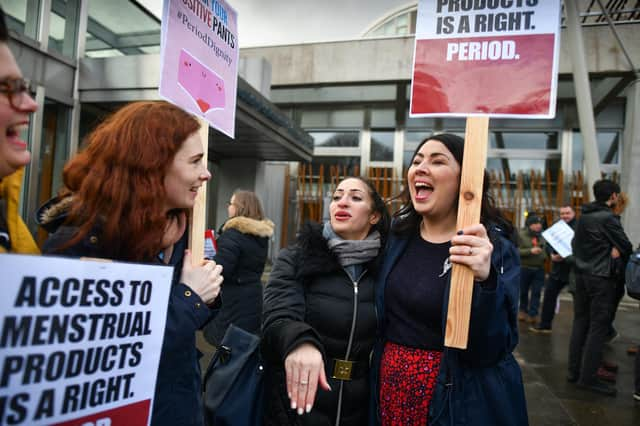It will take a lot more than free period products to end stigma around menstruation – Sarah Zipp and Camilla Mørk Røstvik
This article contains affiliate links. We may earn a small commission on items purchased through this article, but that does not affect our editorial judgement.


This article is republished from The Conversation under a Creative Commons license. Read the original article.
Just two years after becoming the first to provide period products in all schools, colleges and universities, Scotland is the first nation in the world to guarantee access to menstrual products. Although this is the first time menstrual products have been provided universally, Scotland follows in the footsteps of other pioneering efforts. Most notably, Kenya has provided free products in schools for years.
The Scottish bill emphasises the importance of menstrual health education in schools and promotes efforts to dismantle taboos around periods. Yet the importance of education and challenging stigma is often overshadowed by product rollouts.
Beyond products
Advertisement
Hide AdAdvertisement
Hide AdFor decades, activists have been campaigning for better menstrual health education, tax-free products and more. Yet governmental and media interest in the provision of period products is only recently gaining momentum.
Since around 2015, the movement has become increasingly visible. Campaigns and initiatives run the gamut. The common theme across most of these efforts, however, is that they are product-focused. By placing the pad, tampon, cup, or pants at the centre of attention, we may be missing the larger problem: stigma.
Initiatives featuring products and period poverty span from Netflix’s Period. End of Sentence., an Oscar-winning documentary about reducing period stigma in India, to the On the Ball campaign in professional football (an effort to provide period products on football grounds).
Other taboo-smashing campaigns and commercials include HelloFlo (sponsored by Kotex), Bodyform’s Real Blood campaign and Indian cricket’s Rajasthan Royals campaign. Additionally, an explosion in new menstrual management technologies, aka “FemTech”, has transformed the commercial landscape in menstrual health. Sustainable period product companies like Hey Girls and THINX are flooding the market, along with period-tracking apps. In the UK, charity groups such as Bloody Good Period and Big Red Box are busy distributing products.
But people need more than pads, they need knowledge and support. Access to products is enormously important, no doubt. But upon deeper reflection, it is (in part) a continuation of the same old taboo. As women’s, gender and sexuality studies professor Chris Bobel observes in her recent book, the good period is the period we don’t see or know about. Cover it up, conceal it and get on with life. What lies beneath is a messy reality that we rarely deal with or see.
Period shame
Navigating period woes can be daunting. From excessive bleeding and pain to hormonal changes and period poverty, many suffer in silence due to menstrual stigma. Dangerous traditions, such as menstrual huts in Nepal are abusive and sometimes deadly. Globally, harmful myths and restrictions prevent many from participating in important activities, from sport to school to cooking.
We know that strong taboos often prevent people from asking for help and support, including asking for free products. A Plan International UK study found that nearly half of girls between 14 and 21 were embarrassed by their periods. The shame persists into adulthood: about 20 per cent of UK women surveyed by ActionAid also felt uncomfortable talking about their periods and whether they had a difficult or easy cycle.
The experience of non-binary and trans people is less clear, but recent research shows that they face these challenges with additional distress over using public toilets, gender dysphoria, and discrimination.
Smashing stigma
Advertisement
Hide AdAdvertisement
Hide AdThe broader menstruation movement seeks to fill the gaps that products cannot fill. Creative approaches to educating about menstruation include work from artists, comic book writers and zine makers. Advocacy groups such as Days for Girls, The Women Win Foundation and Menstrupedia have developed education resources.
Research groups in the UK and USA are collaborating with international partners to better understand the lived-experiences of menstruation around the world. The Palgrave Handbook of Critical Menstruation Studies is a first-of-its kind global, open-access collection of research on menstruation.
So, where do we go from here? There are several key things that will help reduce menstruation stigma, including:
Better, more inclusive, menstrual cycle and health education for all, beginning in primary school and including boys. This education should continue throughout secondary school, as teens progress through puberty and have evolving needs. Educating teachers and coaches is also key. Access to adequate, safe and environmentally sustainable products that are freely available to all people who menstruate, and include a range of technological options to fit all body types and needs. Support in terms of coping with pain, emotional and physical changes and more. Normalising menstruation is key to helping people feel comfortable and shedding the shame of periods. Here, research can support our understanding. A Sport England study highlighted barriers for participation in sport and PE amongst adolescents, with period-related issues being one of them. There may be some fairly easy fixes, such as not requiring white shorts for sport teams. Other strategies for coping, from nutrition to pain medicine, could also make a big difference. Including diverse perspectives from the LBTQ+ community, people with disabilities and people from varied cultural/ethnic backgrounds is key.
Above all, we need to talk about menstruation more freely, and work towards shedding the shame that has kept people in the dark about their own bodies for generations.
Independent researcher Lilamani de Soysa contributed to this article.
Sarah Zipp, Lecturer, Faculty of Health Science and Sport, University of Stirling and Camilla Mørk Røstvik, Research Fellow, University of St Andrews
This article is republished from The Conversation under a Creative Commons license. Read the original article.
Comments
Want to join the conversation? Please or to comment on this article.